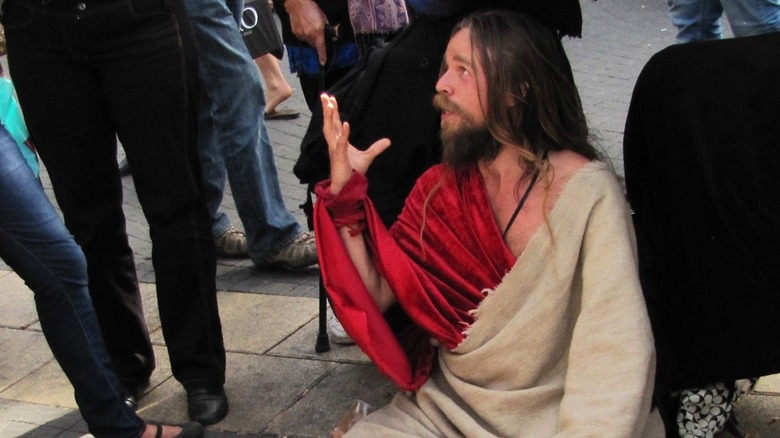Here's What Happens When You Get Jerusalem Syndrome
Jerusalem is one of the most important ancient cities in the world. The Israeli city sits at the convergence of three religions — Islam, Christianity, and Judaism — and as such is home to various shrines, historical sites, and other places of deep significance to the visitor's faith.
However, as Wired reported, some visitors to Jerusalem find that the aura of religion that permeates nearly every square inch of the city is overwhelming, and have an intense psychiatric reaction to it. Specifically, the condition is known as "Jerusalem syndrome," and it occurs when a visitor to the city suddenly comes down with psychotic delusions, obsessive ideas, or other forms of psychoses, almost always tied to religion. Further, the illness purportedly spikes around major religious holidays, such as Christmas or Easter or Passover.
At this point it bears noting that Jerusalem Syndrome is, at best, poorly understood. For example, according to Psychiatry Online, researchers are split on whether or not the disease is a distinct form of psychosis, or whether it's just an expression of something that already exists.
This is what happens when you get Jerusalem Syndrome.
Sufferers of Jerusalem syndrome experience different manifestations
There is no one way to describe how someone experiences Jerusalem Syndrome, as it manifests differently in everyone who exhibits it. Further, sufferers bring with them their own religious experiences — perhaps they came from a strict, fundamentalist family, or from a quasi-Christian cult — and those experiences inform the symptoms the patient suffers.
Vice writer Chris Nashawaty described the symptoms of Jerusalem Syndrome as coming on gradually. "At first the victim may begin to feel symptoms of anxiety, nervousness, and insomnia," he wrote. What follows may be a compulsion to visit certain holy sites. Sufferers may then start performing ritualistic cleaning, such as shaving their body hair or repeated washing. Some then take to the streets to preach, shouting to everyone within earshot that redemption is at hand. Others may become convinced that they are Jesus Christ himself.
Although the disease has been played for laughs in popular culture, it is no laughing matter. For example, British cyclist Oliver McAfee was known to be cycling through the Middle East when he disappeared, and evidence he left behind suggests he may have become convinced that he needed to disappear into the desert for 40 days and 40 nights, as Jesus did, according to The Guardian. Similarly, an unnamed German woman visited Jerusalem and was soon accosting tourists, telling them that the Messiah was coming.

